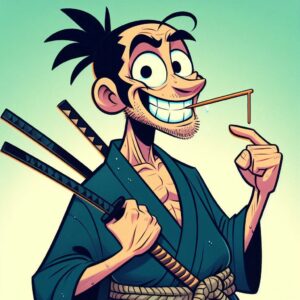武士は食わねど高楊枝とは?
「武士は食わねど高楊枝(ぶしはくわねどたかようじ)」とは、たとえ生活が苦しくても、武士はプライドを守って気高く振る舞う、という意味の日本のことわざです。この表現には、困窮している時でさえも、誇りや品位を捨てずに立派な態度を保つという意味が込められています。
このことわざの由来
「高楊枝(たかようじ)」とは、食事をした後のように楊枝を口にくわえて使う動作のことです。昔、武士は貧困ゆえに食事が十分にとれないこともありましたが、それを周囲に悟られないように、あたかも食事をした後のように「高楊枝」をして見せたと言われています。こうした行動には、「飢えや貧困を他人に知られたくない」「人に恥をかかせたくない」という武士の矜持(プライド)が反映されています。
この表現の使われ方
「武士は食わねど高楊枝」は、次のような場面で使われます。
困窮しても誇りを守る姿勢
生活に困っているにもかかわらず、堂々とした態度を崩さない、または無理をしてでも上品に見せようとする姿勢を指す際に使われます。例えば、見栄を張ってお金を使ってしまう人や、苦しい時でも気品を保とうとする人に対して、「まるで武士は食わねど高楊枝だね」といった表現がされることがあります。
見栄やプライドを優先する行動
必要以上に見栄や体裁を重んじること、または、恥を見せないために自分を飾る行為についても、この表現で表されます。特に、内心の困難を隠して余裕のあるふりをする人に対し、周囲が使うことがあります。
逆境での毅然とした態度
逆境に立たされても品格や自信を失わず、毅然とした態度を貫く人への称賛としても用いられることがあります。苦境でも他者に弱みを見せず、気高い姿勢を保ち続ける人の強さを称える場面でも使われることがあります。
類似表現
「清貧(せいひん)」という言葉も似た意味を持ちますが、こちらは「清らかな心で貧しさを受け入れる」という肯定的なニュアンスが強いです。一方で、「虚勢を張る」などは、「武士は食わねど高楊枝」のように、見栄を張る際の少し否定的な意味合いに近い表現です。
「武士は食わねど高楊枝」は、プライドを重んじる日本人の美学を反映した表現です。苦しい状況でも他人にそれを見せず、堂々と気高く振る舞う姿勢を示すもので、武士道精神や「誇り高くあるべき」という価値観が込められています。この言葉には、生活に余裕がない時でも、内面的な品格を守ることの大切さを教える意味が含まれています。
Bushi wa shokuwedo takayouji” is a Japanese proverb meaning that even if life is hard, a samurai will protect his pride and behave nobly. This expression implies that even in times of hardship, one should maintain an honorable attitude without abandoning one’s pride and dignity.
Origin of this proverb
Takayouji” refers to the action of holding a toothpick in one’s mouth, as one does after eating a meal. In the old days, samurai were so poor that they sometimes did not have enough food to eat, and it is said that they would show “takayouji” as if they had just eaten a meal so that others would not realize it. Such behavior reflects the pride of the samurai in not wanting others to know about their hunger and poverty, and not wanting to embarrass others.How this expression is used
The phrase “samurai don’t want to eat, but they want to be noble” is used in the following situations.An attitude of defending one’s pride even in times of need:
This expression is used to refer to a person who, despite his or her poverty, maintains an imposing attitude or tries to appear elegant even if he or she has to strain to do so. For example, a person who spends money to look good or tries to maintain his or her dignity even in times of hardship is sometimes described as a “samurai who doesn’t eat, but still has a high toothpick.Behavior that prioritizes vanity and pride:
This expression is also used to describe a person who puts more value on vanity or appearance than is necessary, or who decorates himself/herself to avoid showing shame. It is sometimes used by those around them, especially those who hide their inner difficulties and pretend to have more time on their hands.Resolute attitude in adversity:
It is also sometimes used as a compliment to those who remain resolute and do not lose their dignity or confidence in the face of adversity. It can also be used to praise the strength of a person who maintains a noble attitude and does not show weakness to others, even in difficult times.Similar expressions
The word “seihin” (meaning “pure poverty”) has a similar meaning, but it has a more positive nuance of “accepting poverty with a pure heart. On the other hand, “to put on airs,” for example, has a slightly negative connotation of being vain, as in the phrase “samurai do not eat, but they do not drink, but they are noble.Conclusion
The expression “samurai don’t eat, but you don’t eat,” reflects the aesthetics of the Japanese people, who value pride. It indicates the attitude of not showing it to others even in difficult circumstances, but acting with dignity and nobility, and is imbued with the spirit of bushido and the value that one should be proud. This phrase is meant to teach the importance of protecting one’s inner dignity even when life is not easy.
AIが描いた「武士は食わねど高楊枝」







コメント